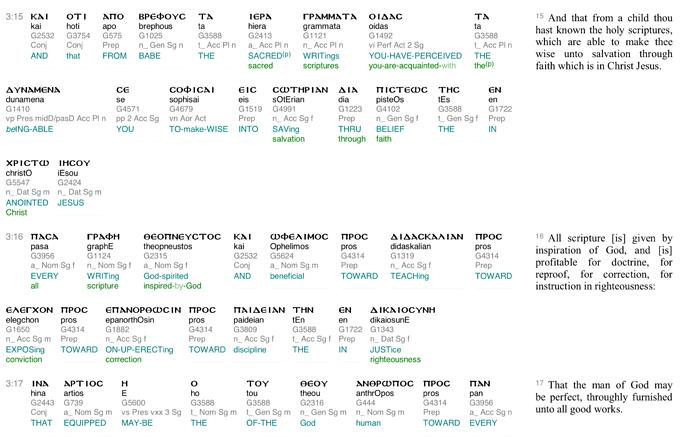So because the Tyndale version has this, the O.P thinks thats how doctrine is determined?
Secondly, i note the O.P inclusion of grammatical markers…comas and full stops, why?
Remove all of that, read the text and then tell me it reads differently in the greek.
Doctrine of scriptural inerrancy and inspiration isnt determined soley on 2 timothy 3.16
In 2 Tim 2 Paul says
14Remind the believers of these things, charging them before Goda to avoid quarreling over words, which succeeds only in leading the listeners to ruin.
He is teaching us to be wary of abandoning our faith in order to follow deceitful spirits and the teachings of demons,
2 Timothy 4:3
For the time will come when men will not tolerate sound doctrine, but with itching ears they will gather around themselves teachers to suit their own desires.
In nitpicking over this, the O.P is ignoring the real point of the text.
Finally, 2 Tim 3.16 isnt the only text about Gods inpiration…
John 17:17
Sanctify them in the truth; your word is truth.
Acts 1:16
Brothers, the Scripture had to be fulfilled, which the Holy Spirit spoke beforehand by the mouth of David concerning Judas, who became a guide to those who arrested Jesus.
1 Corinthians 2:12-13
Now we have received not the spirit of the world, but the Spirit who is from God, that we might understand the things freely given us by God. And we impart this in words not taught by human wisdom but taught by the Spirit, interpreting spiritual truths to those who are spiritual.
Matthew 4:4
But he answered, “It is written, ‘Man shall not live by bread alone, but by every word that comes from the mouth of God.’”
1 Thessalonians 2:13
And we also thank God constantly for this, that when you received the word of God, which you heard from us, you accepted it not as the word of men but as what it really is, the word of God, which is at work in you believers.
2 Peter 1:20-21
Knowing this first of all, that no prophecy of Scripture comes from someone’s own interpretation. For no prophecy was ever produced by the will of man, but men spoke from God as they were carried along by the Holy Spirit.
2 Peter 3:15-15
And count the patience of our Lord as salvation, just as our beloved brother Paul also wrote to you according to the wisdom given him, as he does in all his letters when he speaks in them of these matters. There are some things in them that are hard to understand, which the ignorant and unstable twist to their own destruction, as they do the other Scriptures.
